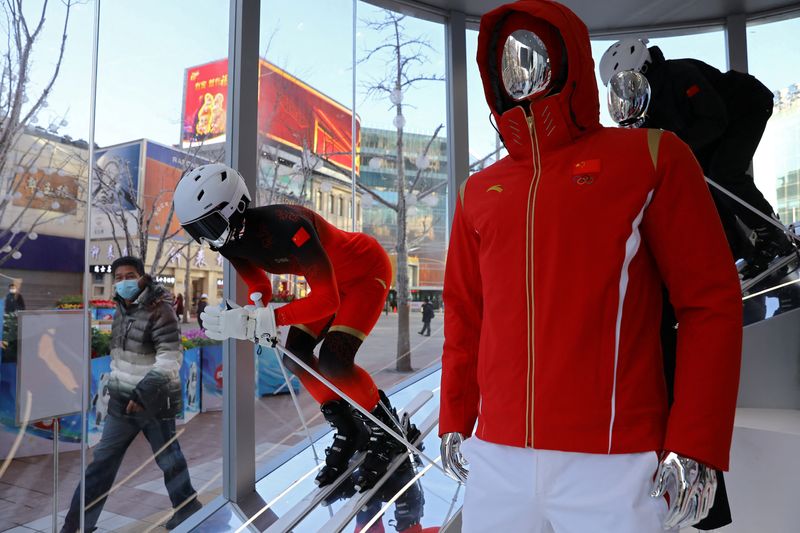By Sophie Yu and Brenda Goh
BEIJING – The start of the Beijing Winter Olympics has triggered a gold rush for winter sport goods in China, with online purchases of equipment and clothing from brands such as Anta Sports and Descente surging, and physical stores stripped bare.
The Chinese e-commerce firm JD.com’s said sales of ski products on its platform for the period from Jan. 31 to Feb. 4 – the day of the opening ceremony – tripled from the same period last year. Ski goggle sales jumped 15 times and sales of figure skates and ice hockey sticks also jumped.
Over the same period, sales of ski equipment and skating products on Alibaba Group’s Tmall marketplace rose 180% and 300% respectively, the company said.
Neither platform provided sales figures.
Sales of down jackets made by China’s Anta and Descente of Japan in the same period doubled from the previous year, JD.com said.
Huang Xiaohu, a 34-year-old businessman in the northeastern city of Dalian, said he had driven to his local Decathlon store the day after the ceremony in search of a snowboard and ski clothes, only to leave empty-handed.
“Everything was sold out,” he said. “There were only socks left, but the choice of those was limited too.”
Anta, an official sportswear partner of the Beijing Games, led a group that paid 4.6 billion euros ($5.3 billion) three years ago for Finland’s Amer Sports, whose portfolio includes European ski brands Atomic and Salomon, and Canadian outerwear brand Arc’teryx.
Xiaohongshu, an Instagram-like lifestyle content platform, reported a spike in searches for Team Canada’s red and white outfit and its manufacturer Lululemon after the opening ceremony.
Makers of winter sports garments and equipment have been rushing to expand their presence in the world’s second-largest economy, betting that the Olympics kindle enthusiasm beyond the Feb. 20 close in a nascent market.
U.S.-based Spyder, KJUS and Mammut of Switzerland, Helly Hansen of Norway, Templa of Belgium, and Rossignol and Fusalp of France are among brands that have expanded into China in the last two years, while Goldwin of Japan and Head Sportswear of Austria opened their first stores in China in late December.
China hopes the Games turn it into a winter sports power: President Xi Jinping has set a target of getting 300 million Chinese involved in ice and snow sports, with the aim of building a 1 trillion yuan ($150 billion) industry.
German fashion group Bogner, which makes upmarket winter jackets and ski wear, opened its first self-operated store in Beijing late last year and aims to open more 80 brick-and-mortar stores in China in partnership with Chinese brand Bosideng by 2025 that will sell two of its brands, Bogner and Fire+Ice.
Its down jackets sell for 8,000 to 22,000 yuan ($1,250 to $3,450) in China.
“China’s ski market is developing towards the high-end and Chinese consumers value individualism,” said William Yang, general manager of Greater China Bogner. ($1 = 6.3623 Chinese yuan renminbi)
($1 = 0.8757 euros)
(Reporting by Sophie Yu and Brenda Goh; Editing by Kevin Liffey)





